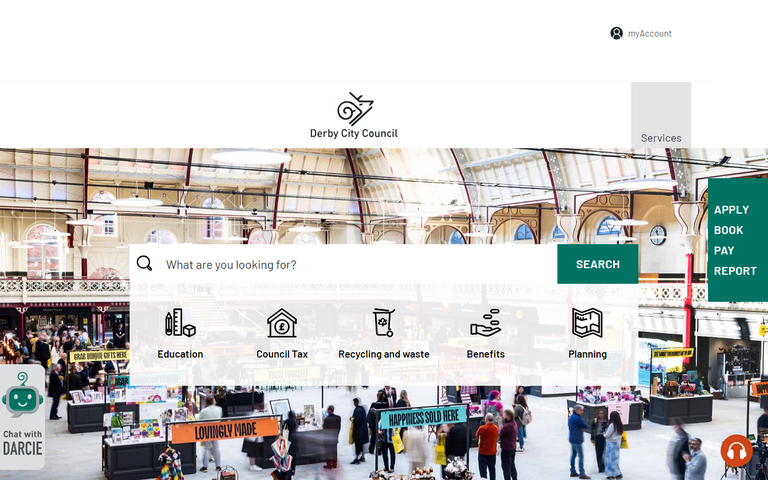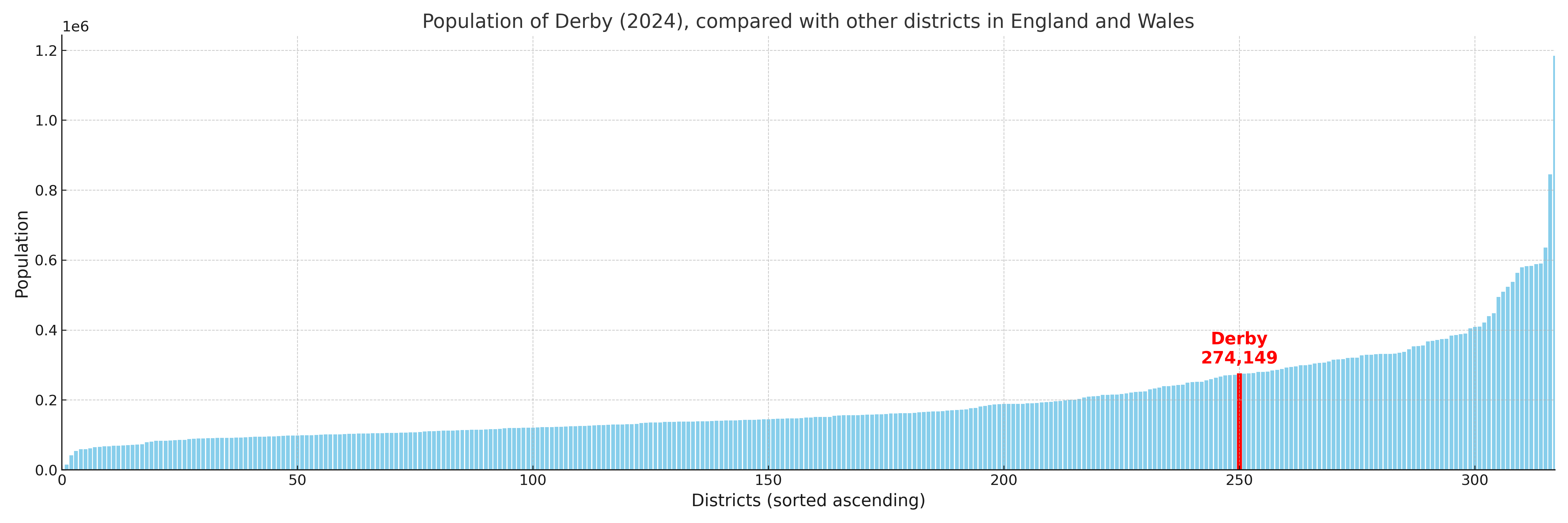Derby
§ This page gives an overview of the Derby local authority district, bringing together key facts, maps, and data to help you quickly understand the area. This is one of 361 LAD profiles on Baseview.
Overview ⁞ Derby is a historic city on the River Derwent, known as one of the birthplaces of the Industrial Revolution. Landmarks include Derby Cathedral with its tall tower, the Museum of Making at Derby Silk Mill, and the Arboretum, England’s first public park. The city combines historic streets, Victorian architecture, and modern shopping areas with green spaces along the river. Its location on the edge of the Peak District makes it a cultural hub with easy access to scenic countryside.
Derby Boundary Map
This map shows the official boundary of the Derby local authority district, based on the latest geographic data published by the Office for National Statistics (ONS). It provides a clear view of the district’s extent and helps you understand how the area fits within the wider regional and national landscape.
Contains OS data © Crown copyright and database right 2025. Source: Office for National Statistics licensed under the Open Government Licence v3.0.
The administrative boundary of Derby can also be viewed on OpenStreetMap: District Boundary of Derby.
Key Facts about Derby
What region is Derby in? Derby is in the East Midlands of England, a region within the UK.
What county is Derby in? Derby is in the county of Derbyshire.
Is Derby a city? Yes, Derby is a city. Derby holds official city status as one of the 76 designated cities in the UK.
Who governs Derby? The local government for this district is: Derby City Council (Unitary Authority).
▶ Official website of Derby City Council 🔗 derby.gov.uk

Which police force covers Derby? Policing in Derby is provided by Derbyshire Constabulary 🔗 derbyshire.police.uk, which serves 9 local authority districts: Amber Valley ⁞ Bolsover ⁞ Chesterfield ⁞ Derby ⁞ Derbyshire Dales ⁞ Erewash ⁞ High Peak ⁞ North East Derbyshire ⁞ South Derbyshire.
Derby in International Geographies
In the International Territorial Levels (ITLs) hierarchy, Derby is within one of ITLs Level 2 area, Derbyshire and Nottinghamshire, that contains the following 6 ITLs Level 3 areas:
(ITL 1) East Midlands
(ITL 2) ⇒ Derbyshire and Nottinghamshire
(ITL 3) ⇒⇒ Derby ⁞ East Derbyshire ⁞ South and West Derbyshire ⁞ Nottingham ⁞ North Nottinghamshire ⁞ South Nottinghamshire
The International Territorial Levels are used by OECD member countries for statistical purposes to classify administrative areas. We have this listable page for easy browsing of ITL names and codes: International Territorial Levels.
Constituencies in Derby
Derby is divided into 3 parliamentary constituencies, listed below in alphabetical order.
A constituency is a specific geographical area that elects one Member of Parliament (MP) to represent them in the House of Commons. The United Kingdom is divided into 650 parliamentary constituencies. We have this list page for easy browsing of all UK parliamentary constituencies: List of Constituencies.
Wards in Derby
Derby is divided into 18 wards, listed below in alphabetical order.
- Abbey
- Allestree
- Alvaston North
- Alvaston South
- Arboretum
- Blagreaves
- Chaddesden East
- Chaddesden North
- Chaddesden West
- Chellaston & Shelton Lock
- Darley
- Littleover
- Mackworth & New Zealand
- Mickleover
- Normanton
- Oakwood
- Sinfin & Osmaston
- Spondon
In the UK, a ward is a subdivision of a local authority area, used mainly for electoral and statistical purposes. Defined by the ONS, wards represent the primary unit for local elections, each returning one or more councillors to the local council. Wards are also used as a key geography for presenting population and census data. We have this list page for easy browsing of all electoral wards: List of all Electoral Wards in the UK.
Parishes in Derby
Derby is entirely unparished—there are no civil parishes in this local authority district.
Parishes are the lowest tier of local government; where they don’t exist, those very local services and representation sit directly with the principal council. We have this list page for easy browsing of all parishes: List of Civil Parishes in England and Wales.
Post Towns in Derby
Below is a list of post towns in Derby, grouped by postcode area:
DE ▸ Derby (DE1 / DE3 / DE21 / DE22 / DE23 / DE24 / DE65 / DE72 / DE73 / DE74 / DE99)
The UK postal hierarchy begins with broad postcode areas (such as “CB” or “M”), which are divided into smaller postcode districts (such as “CB8” or “M1”) to support accurate mail routing. Each postal address is anchored by a designated post town, the official locality name used in the UK postcode system, which operates independently from Local Authority Districts —the administrative boundaries used for council tax and local government services. Because they serve different purposes, a property’s postal address and its local authority district do not always align exactly.
Built-up Areas in Derby
Derby covers 4 built-up areas, listed below in alphabetical order.
- Borrowash *
- Derby *
- Little Eaton *
- Quarndon *
In the UK, a Built-up Area (BUA) is a continuous urban area of at least 20 hectares (0.2 km²), defined by the ONS as land where buildings are generally no more than 200 metres apart, such as towns, cities, or large villages. (Note: A BUA name marked with an asterisk (*) indicates that the area is situated partly in the district of Derby.)
We have this list page for easy browsing of all built-up areas: List of all Built-up Areas in GB.
Railway Stations in Derby
Derby is served by a number of National Rail stations, providing rail connections to nearby towns, cities, and destinations across Great Britain. The railway stations listed below are located within the Derby Local Authority District and are grouped by train operating company for clarity.
- East Midlands Railway ▸ Derby (DE1 2RU) ⁞ Spondon (DE21 7RX) ⁞ Peartree (DE24 8DT)
This is a district-level view only. For a complete list of all National Rail stations across Great Britain, see the UK National Rail Stations Directory.
Derby compared with other districts in the UK
This section shows how Derby compares with other local authority districts in the UK, using a variety of measures and rankings.
Derby has 18 electoral wards.

Derby has a population of 274,149 (2024 mid-year estimate by ONS)

Population and Migration Trends in Derby
This chart shows the population trend for Derby from 2015 to 2024. It provides a quick overview of whether the local authority is growing, stable, or declining over time, and helps set context for the migration patterns shown below.
Population change is influenced by natural change (births minus deaths) and migration. The net migration chart below focuses on migration, separating internal migration (moves within the UK) from international migration (moves to and from abroad). Positive values indicate net inflows, while negative values indicate net outflows. The rate labels (per 1,000 residents) help compare migration intensity across years, even when the population size changes.
More local statistics and data for Derby can be found on the ONS statistics for Derby.